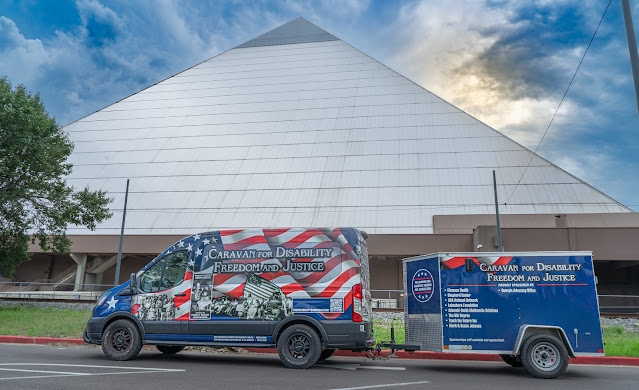Memphis Tennessee
Wednesday, July 3, 2024
I got a call about an hour before the Caravan was scheduled to arrive in Memphis. The Driver, CW, already had the schedule and just wanted to know if we had something before the Pizza lunch that was on his schedule. I said “no,” but I had packed the schedule with places to visit before the Caravan for Disability Freedom and Justice moved on. I wanted everyone to know that the Caravan had been here in Memphis.
Much of the reason for the Caravan is because of Memphis.
Less than two weeks before the Caravan arrived in Memphis, people with disabilities all over the country were celebrating the twenty-fifth anniversary of the US Supreme Court’s Olmstead decision (June 22, 1999). Generally, the decision reinforced the Civil Rights protections of the 1990 Americans with Disabilities Act for people with disabilities. Olmstead held that segregation of persons with disabilities is discrimination.
Olmstead is also the story of two women that sued the state of Georgia because they wanted to live in their own home. They did not wish to receive services in an institution. The inconsistency is that home and community-based services are more desirable and cost-effective than institutional services, but many states only offered services that people with disabilities needed in expensive institutions.
That was true for Tennessee. And when Latonya Reeves was young, she and her family were facing a life in an institution. In Tennessee, the only way for Latonya to get the services she needed was to, as a young woman, move into a nursing home.
Latonya Reeves video: https://vimeo.com/751940724
Latonya can tell her story much better than I can. But I can tell you of a time when the Memphis Center for Independent Living, now Disability Connection Midsouth, helped people with disabilities get out of institutions. The Center here in Memphis helped people leave the state of Tennessee where they could not get services and move to Colorado, like Latonya Reeves did, to live in their own home and not an institution.
The Center launched a decades long advocacy campaign to change things in Tennessee. But while we worked to change the institutional bias here in our state, we helped people escape institutions to live in their own homes. The parallel to the Underground Railroad was so clear to us, we called it the Underground Railroad. I am sure that other people did this, but no one talked about it much. I cannot imagine a nonprofit that is so passionate about their mission that they would move a person out-of-state, sometimes against a doctor’s orders (AMA), away from their family and into the care of people that they had only talked to over the phone.
Deborah Cunningham was the director of MCIL who came up with the idea and developed it into a workable solution for at least a dozen Memphians. It was a different time, but as I think back on the Underground Railroad, I just cannot imagine how brave Deborah was to risk her job and the Center to see people live in their own home. And how brave the individuals were who left their home, their family and friends to have independence.
All over the country I am sure that people with disabilities remember a much different time, now twenty-five years ago, when we did not have the same choices we have today. Please celebrate our Freedom and Justice and follow the Caravan in your area.
CW and I got photos of the staff of Disability Connection Midsouth and the Arc. We stopped at Graceland, STAX, The Lorraine Hotel, The Pyramid (Bass Pro Shop), Beal Street and other landmarks around Memphis. Congressman Cohen met us at The Arcade, to get a photo with the Caravan in his Latonya Reeves shirt.
I am really proud of this story in Memphis history. But I also know that for Latonya and all the people with disabilities who did escape on the Underground Railroad, there were many more who never knew what life was like outside of the institutions. I know we still have people, old and young, who will die in an institution.
Support the Latonya Reeves Freedom Act (H.R. 2708 and S. 1193), introduced by Rep. Steve Cohen from Memphis. The bill secures our right to live in the community and not, because of our disability, be forced into an expensive institution.
Photo Album from Memphis: https://flic.kr/ps/CRKuE
This is a photo of the Caravan at the institution were Latonya Reeves was in Memphis. Now defunct, the property is still kept up, but it is empty at this time. A reminder of our segregated past.




